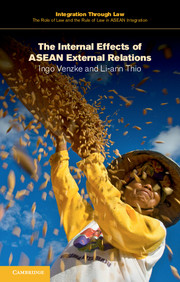Book contents
- Frontmatter
- Contents
- General editors’ preface
- Acknowledgements
- List of abbreviations
- 1 Introduction and parameters of inquiry
- 2 Contextualising ASEAN
- 3 Types of external agreements
- 4 Agreements of ASEAN as an International Organization
- 5 Plurilateral agreements
- 6 Case study on the Convention to Eliminate All Forms of Discrimination Against Women
- 7 Joint ASEAN agreements
- 8 Conclusions: assessing the internal effects of ASEAN external relations
- Executive summary
- Bibliography
- Index
6 - Case study on the Convention to Eliminate All Forms of Discrimination Against Women
Published online by Cambridge University Press: 05 July 2016
- Frontmatter
- Contents
- General editors’ preface
- Acknowledgements
- List of abbreviations
- 1 Introduction and parameters of inquiry
- 2 Contextualising ASEAN
- 3 Types of external agreements
- 4 Agreements of ASEAN as an International Organization
- 5 Plurilateral agreements
- 6 Case study on the Convention to Eliminate All Forms of Discrimination Against Women
- 7 Joint ASEAN agreements
- 8 Conclusions: assessing the internal effects of ASEAN external relations
- Executive summary
- Bibliography
- Index
Summary
As all ASEAN states are parties to the Convention on the Elimination of All Forms of Discrimination against Women (CEDAW), it is a useful case study on how ASEAN states implement their international legal obligations within the domestic legal framework. Since it dates back to 1979, there is also more practice to draw on for a study of its internal effects, even if it entered into force at different stages for ASEAN Member States.
It thus offers a repository of insight in a matter that is otherwise difficult to grasp. We do not yet have sufficiently evolved case-studies on the internal effects of ASEAN plurilateral agreements. By proxy, we thus study the implementation of CEDAW. A caveat pertains to the fact that the potentially intrusive and transformative reach of CEDAW has been truncated by reservations. For example, contrary to Article 16 CEDAW, countries like Malaysia and Indonesia by dint of Muslim religious law permit polygamous marriages subject to certain conditions such as court permission.
Overall, the international obligations of CEDAW may be implemented in a variety of ways, such as through the form of hortatory aspirational guidelines (a form of domestic soft law), as part of a general programme or policy administered by general or dedicated agencies, or as justiciable rights within individualized adjudicative or quasi-judicial processes. As the Malaysian Court of Appeal noted in AirAsia Berhad v Rafizah Shima Binti Mohamad Aris, ‘[e]ach State decides how best to achieve its implementation. The CEDAW Committee has no enforcement authority; it can only make recommendations highlighting areas where more progress is needed in a particular country.’
Article 2 CEDAW lists the vehicles by which the obligations undertaken by state parties may be satisfied.
- Type
- Chapter
- Information
- The Internal Effects of ASEAN External Relations , pp. 136 - 173Publisher: Cambridge University PressPrint publication year: 2016

